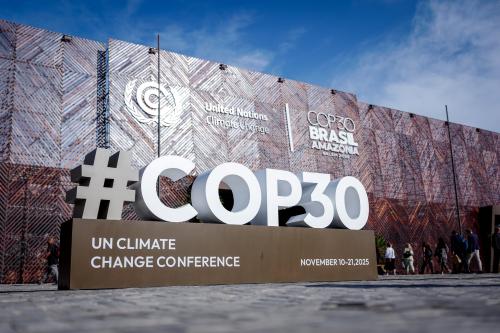During his address at the U.S. Coast Guard Academy graduation this week, President Obama highlighted climate change as “a serious threat to global security, an immediate risk to (U.S.) national security.” Is President Obama right? Are the national security threats from climate change real?
When I listen to the “know-nothing” crowd and their front men in Congress who actively ignore ever-stronger scientific evidence about the pace of climate change, I want to quit my day job and organize civic action to close them down. The celebration of anti-knowledge, the denial of science, the treatment of advanced education as a mark of ignominy rather than the building block of American innovation and citizenship—these are as grave a threat to America’s future as any I can identify. So I’m sympathetic to the Obama administration’s desire to take a bludgeon to climate deniers. But is “national security” the right stick to move the naysayers forward?
The Danger of Overstating for Effect
The White House’s report on the national security implications of climate change is actually pretty measured and largely avoids waving red flags, but it overstates for effect, as do the President’s remarks to the Coast Guard Academy.
The report gets right the notion that climate change will hit hardest where governance is weakest and that this will exacerbate the challenge of weak states; but it’s a pre-existing challenge and almost all weak states are already embroiled in forms of internal war—climate change may exacerbate this problem, but it certainly won’t create it. The White House report also asserts a link to terrorist havens, and of course there are risks here—but it’s far from a 1:1 relationship, and there’s little evidence that the countries where climate will hit governance worst are the places where the terrorism problem is most serious.
The report also highlights the Arctic as a region most dramatically effected by climate change, and that is true—but so far what we’re seeing in the Arctic is that receding ice is triggering commercial competition and governance cooperation; not conflict. The security challenge from the Arctic is modest: the climate challenge of melting ice caps and potential release of trapped greenhouse gases is potential very serious indeed.
Then there are the domestic effects. The report highlights that the armed services may be drawn in more to dealing with coastal flooding and similar crises, and that’s a fair point—though it’s a National Guard point more than its an armed forces point. That is to say, it’s about the question of whether we have enough domestic disaster response capacity: an important question, not obviously a national security question. And it oddly passes over what’s likely to be the most important consequence of climate change in the United States, namely declining agricultural productivity in the American heartland. America’s farmers, not just its coastal cities, are in the front lines here.
All of these are real issues and the U.S. government will have to plan for lots of them, including in the armed services; all fair. But is national security really the right way to frame this? Is linking it directly to the capacities needed for America’s armed services the right way to mobilize support for more serious action on climate change?
Of course the term “security” has been evolving, and has long since extended beyond the limited purview of nuclear risks and great power conflict. Civil wars and weak governance and rising sea leaves are certainly a security issue to somebody, and we’re sure to be involved—whether it’s in dealing with refugee flows, or more acute crises where severe impacts overlay on pre-existing tensions. These are global security issues for someone, to be sure; I’m not sure they are “immediate risks to our national security.
Words Matter
Why does the rhetoric matter? Am I glad that we have a President who cares about climate change? Yes. Do I want the Obama administration to be focusing on mobilizing the American public on this? Yes. So why does it bother me if they use a national security lens? A national security framework implicitly does several things: it invokes a sense of direct threat, which I think distorts the nature of the challenge; it puts military responses front forward, which is the wrong emphasis; and although the report doesn’t get into this question, if the President highlights the immediate national security risk from climate, it displaces other security threats that we confront and truly require U.S. strategic planning, preparedness, and resources. None of this is totally wrong, but surely there are other ways to mobilize the American public to an erosion of our natural and agricultural environment than to invoke the security frame?
Every piece of evidence I’ve seen about the state of temperature change; the real pathway we are on in terms of carbon-based fuels consumption (despite optimistic pledges in the lead up to the Paris climate conference); realistic projections of growth in renewable energies; and demand growth in the developing world (especially India) tells me that we’re rapidly blowing past the two degree target for limiting the rise in average global temperatures, and we’re well on our way to a four degree shift.
We need urgently to pivot our scientific establishment away from the now well-trod field of predicting temperature shift to getting a much more granular understanding about the ways in which changing temperature will affect water sources, agricultural productivity, biodiversity, and dramatic weather events. And we need to treat those who willfully deny science—in climate and other areas—as a serious threat to our nation’s future. I’m just not convinced that national security is the right or best way to frame the arguments and mobilize the America public’s will around this critically important issue.
The Brookings Institution is committed to quality, independence, and impact.
We are supported by a diverse array of funders. In line with our values and policies, each Brookings publication represents the sole views of its author(s).



Commentary
Security risks: The tenuous link between climate change and national security
May 21, 2015